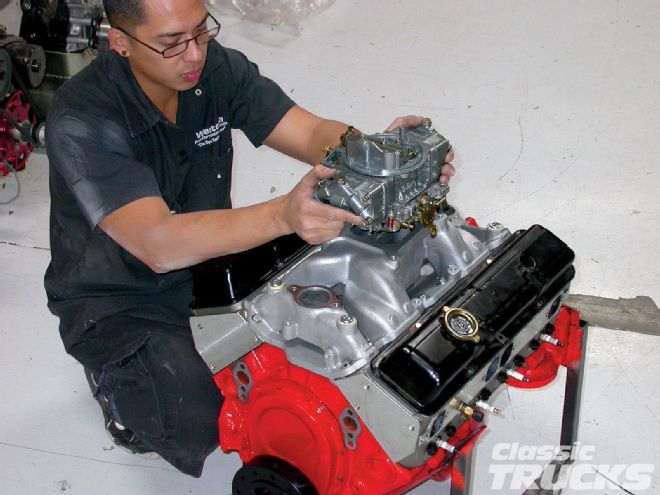
What's the single most important component of any engine buildup? Before you start listing off all the various power-producing engine components, know that the answer resides not underhood, but in your wallet. More than anything else, cost is what ultimately determines the eventual output of any combination.
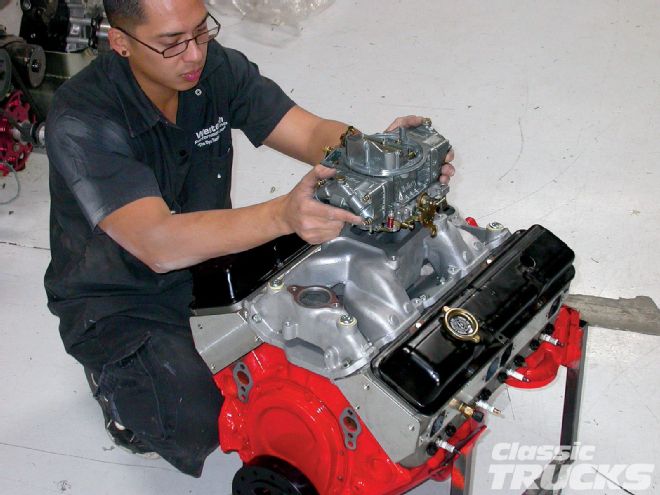
Were cost no object, we'd all be running around with our engine bays stuffed to the firewall with all manner of blown mountain motors, twin-turbo strokers, or maybe even a used NASCAR motor, just for kicks. Unfortunately, cost is a major obstacle and not only is the average enthusiast looking for performance, but performance on a budget. This is doubly true in these uncertain economic times, as bucks for a buildup are even harder to come by. Second only to cost should be application, as an honest appraisal of the power goal and intended usage is critical for proper component selection. The question of how much power is required should be answered more appropriately than the usual, "as much as possible." In fact, for most classic truck applications (at least those destined for daily drivers), peak power should take a back seat to the all-important average power or torque production.
Obviously we were in the mood for a small-block Chevy buildup, but before getting started, we had to define both the build budget and the proposed power output. With available crate motors scattered throughout the Internet, picking a combination that offered an acceptable power curve was just a mouse click away. Unfortunately, picking and paying for said combination were two different stories, especially since we decided that the buildup would cover not just power upgrades to an existing combination, but the entire engine assembly. It might be true that many classic truck owners already have some sort of small-block just begging to be built, but covering an entire assembly aids both current and future small-block owners. Besides, how can you go wrong with a complete, aluminum-headed small-block for around $1,000? That's right; we said a complete small-block Chevy topped off with performance-oriented, aluminum cylinder heads for $1,000! While we might expect to pay that for a single set of cylinder heads, we discovered sources that allowed us to purchase not only heads, cam, and intake, but a complete small-block to go with them.
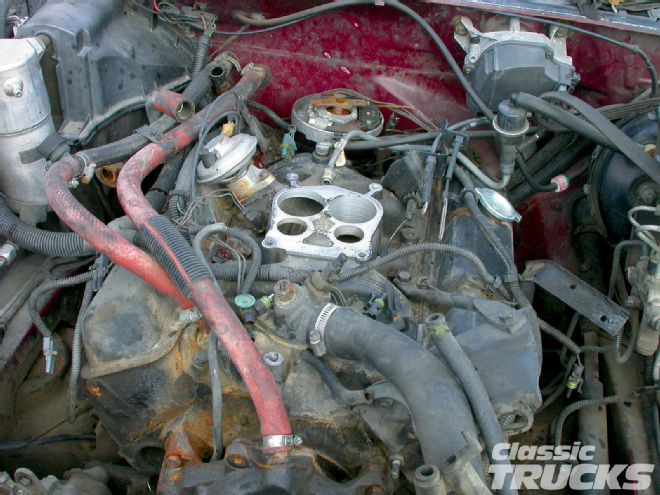 The best place to start any buildup is actually your local wrecking yard. We snagged a complete, running small-block similar to the one shown for $150 (no cameras were allowed in our wrecking yard).
The best place to start any buildup is actually your local wrecking yard. We snagged a complete, running small-block similar to the one shown for $150 (no cameras were allowed in our wrecking yard).
Where on earth (you ask) can you find deals like this? The answer starts off in your local wrecking yard, as small-block Chevy motors are literally a dime a dozen. A little recon through the neighborhood wrecking yards should reveal more small-block Chevys than any other American (or import) V-8. Given the sheer production numbers, this is hardly surprising, but the icing on the cake is that having this many to choose from means you can almost always find something in ready-to-run condition. Obviously a little detective work is required on your part, meaning checking spark plugs, oil, coolant, and even popping a couple of valve covers (or oil pans) to determine the internal condition. Pulling all of the plugs will allow you to rotate the motor, if it spins easy chances are the bearings are in good shape. Look for signs of abuse and neglect and don't just grab the first one you come to. After all, in addition to the purchase price, you are going to put some sweat equity into the removal of the motor so take your time and choose wisely. At our local Pick-A-Part, complete motors were offered for the paltry sum of $200 (plus $50 core). Being savvy bone yarders, we took full advantage of an upcoming sale weekend, where everything was 50 percent off, including complete engines. Though, we would not need most of the components on the engine dyno, our complete motor included everything from oil pan to air cleaner and fan to flywheel (or flexplate).
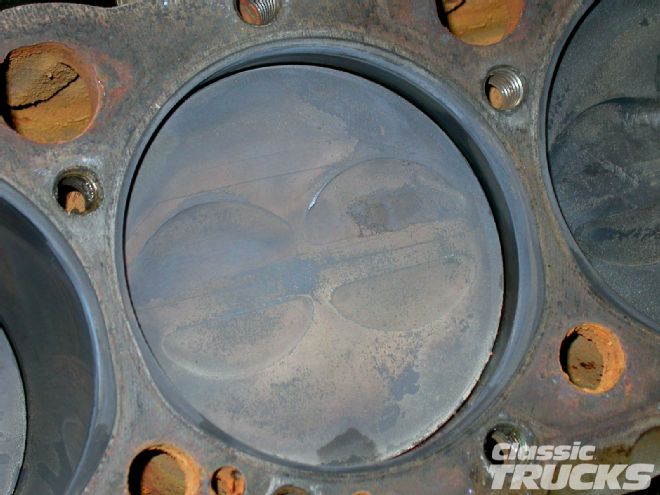 Prior to running on the engine dyno, we pulled the stock heads for surfacing and a valve job. Removing the heads allowed us a peek at the stock pistons and cylinder walls.
Prior to running on the engine dyno, we pulled the stock heads for surfacing and a valve job. Removing the heads allowed us a peek at the stock pistons and cylinder walls.
The sale weekend allowed us to snag a suitable small-block for just $150 ($100 plus $50 core). The wrecking yard also offered a guarantee for an additional $12, but we declined, confident in our inspection, but the $12 is probably money well spent in case you get the motor home and find a spun bearing or some other catastrophic malady. Before presenting the motor up for purchase, we made a few important wrecking yard upgrades, meaning we replaced a few of the missing and/or undesirable items on the original motor with components sourced from other small-blocks. If you look around, hidden treasures abound. During our many trips to the yards, we located a set of long-tube headers on a fullsize truck, an Edelbrock Performer intake manifold, and matching carb on (of all things) a van, and more than a few open element air cleaners. These were long gone by the time sale weekend rolled around, but we did manage to find a Holley double-pumper carb on a big-block Ford truck. Along with the carb, we secured new(ish) plugs, wires, and a (recently rebuilt) HEI distributor. Since all of these components are included in the price of your purchase, why not optimize your motor before stepping up to the cashier? We also made sure that all of the small pieces were present and accounted for, including distributor hold-down, timing pointer, and all of the necessary hardware (including a missing damper bolt).
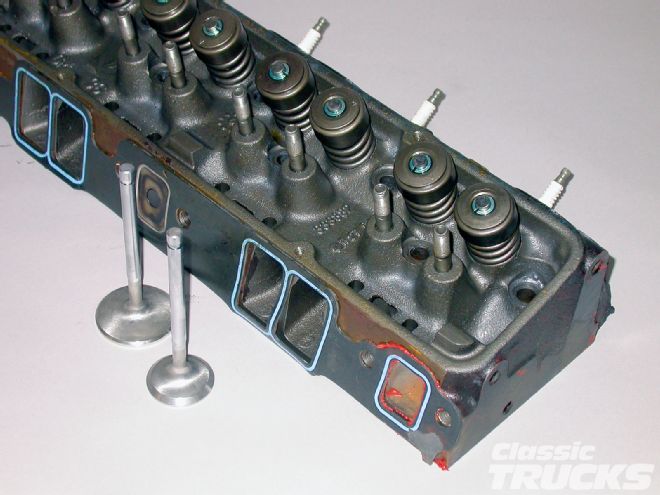 Before running the aluminum Procomp heads and cam upgrade, we decided to port and mill the stock 882 heads. Actually the guys at L&R supplied a second set to facilitate the on the dyno.
Before running the aluminum Procomp heads and cam upgrade, we decided to port and mill the stock 882 heads. Actually the guys at L&R supplied a second set to facilitate the on the dyno.
Now that we had a complete (hopefully running) small-block for just $150, it was time to decide on the power output. Everyone talks horsepower, but impressive acceleration comes from torque. Since we were building what amounted to a street motor destined for daily driving, we decided to concentrate not on peak power but rather on torque production. Having 400 hp is all well and good, but since that power peak comes high in the rev range, it is all but useless in the real world. The vast majority of daily driving, even spirited acceleration, comes in the lower rev ranges. A motor that requires running through the gears at maximum rpm is detrimental to both fuel economy and your license, to say nothing of the life expectancy of the motor itself. Stepping on the gas and feeling the instant gratification that only torque can bring is something that can be enjoyed every time you're behind the wheel. With that in mind, we decided a reasonable goal for our low-buck truck small-block would be 400 lb-ft of torque. In fact, we were hoping to not only reach the 400 lb-ft mark, but exceed it over a broad rpm range. The desire for a fat torque curve in lieu of a peaky powerplant obviously helped dictate our choice of performance components.
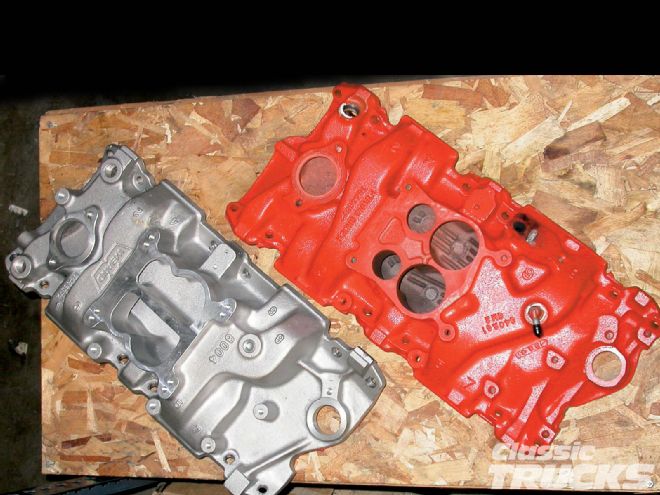 Before running the aluminum Procomp heads and cam upgrade, we decided to port and mill the stock 882 heads. Actually the guys at L&R supplied a second set to facilitate the on the dyno.
Before running the aluminum Procomp heads and cam upgrade, we decided to port and mill the stock 882 heads. Actually the guys at L&R supplied a second set to facilitate the on the dyno.
To achieve our goal of building a small-block Chevy capable of eclipsing 400 lb-ft of torque for something near $1,000 we searched long and hard for the best deals on performance parts. Sure, we could use eBay and buy some used components, but we decided that the important parts, the ones that all but determine the eventual power curve of the engine (meaning heads, cam, and intake) would be new. Wanting aluminum heads, we did a search online and ran across small-block Chevy heads from Procomp. Offered in aluminum or cast iron, as-cast or with complete CNC porting, our quest for affordable torque led us to a set of 190cc as-cast, aluminum heads. The Procomp aluminum heads offered our ideal combination of exceptional flow numbers and competitive pricing. The Procomp heads featured 190cc intake ports, 70cc exhaust ports and a 2.02/1.60 valve combination. The big news was, of course, the aluminum construction (less weight than our iron factory heads) and the significant increase in port flow, not to mention an increase in compression ratio thanks to the 64cc chambers (compared to 73cc for our 882 heads). Where the stock GM 882 heads struggled to exceed 200 cfm, the Procomp heads flowed nearly 250 cfm on the intake and 190cfm on the exhaust side. These flow numbers offered by Procomp can be increased significantly through CNC porting for another $400 to $550. Best of all, the 190cc as-cast aluminum heads can be purchased online for less than $600. Ours cost just $589, but figure on spending $600 to $625 for a complete set.
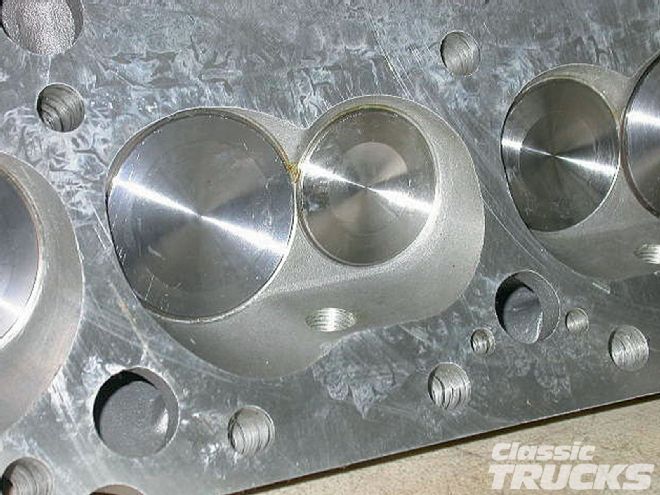 Before running the aluminum Procomp heads and cam upgrade, we decided to port and mill the stock 882 heads. Actually the guys at L&R supplied a second set to facilitate the on the dyno.
Before running the aluminum Procomp heads and cam upgrade, we decided to port and mill the stock 882 heads. Actually the guys at L&R supplied a second set to facilitate the on the dyno.
With enough head flow, our low-buck truck small-block now required cam timing, an intake manifold, and a few other minor accessories. Keeping torque foremost in mind, we elected to go with a very streetable and affordable cam profile from Summit Racing. For just $89, we received the Sum K1105 kit. The kit included the hydraulic flat-tappet performance cam (our junkyard motor was an early non-roller 350) that offered a .465/.488 lift split, a 224/234 duration split, and a 114-degree lobe separation angle. The kit also included a new set of lifters (never reuse old flat-tappet lifers unless they are matched to the original cam). For induction chores, we combined our junkyard Holley with a dual-plane intake also from Procomp. Listed for sale at just $129, the dual-plane promised plenty of midrange torque without sacrificing peak power. For street use, the dual-plane should always be considered over the racy single-plane design. Procomp also supplied a complete gasket set, a set of roller tip rockers, and cast-aluminum valve covers. The new heads and use of roller rockers required a new set of hardened pushrods-ours came from Summit Racing for $29.
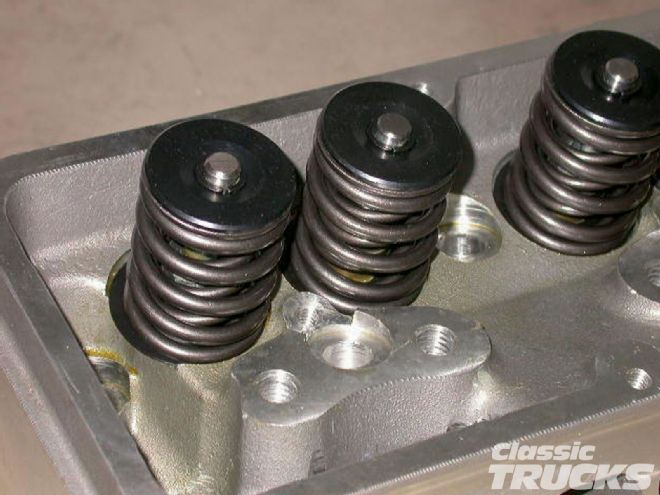 Before running the aluminum Procomp heads and cam upgrade, we decided to port and mill the stock 882 heads. Actually the guys at L&R supplied a second set to facilitate the on the dyno.
Before running the aluminum Procomp heads and cam upgrade, we decided to port and mill the stock 882 heads. Actually the guys at L&R supplied a second set to facilitate the on the dyno.
Rather than simply reassembling the motor with the performance components, we decided to add a little something to the story by running not one but three different engine configurations. The pricing total only reflects the amount required to reach the final configuration, the others were run to illustrate what is possible with even less expenditure. Naturally we needed to first establish a baseline by running the motor in stock configuration. Before running our wrecking yard wonder, we removed the heads and had them sent out for a valve job and surfacing. If you plan on taking this route, figure spending a few extra bucks on valvesprings, as our high-mileage stockers limited the engine speed to just 5,000 rpm before experiencing valve float. Removing the heads gave us the opportunity to take a peak inside the cylinders. We chose wisely, as the crosshatch was still dimly present and everything appeared to be in good working condition. A subsequent leak down and compression test revealed our test motor was well sealed and ready for action. Priming the motor with an electric drill revealed over 50 psi of oil pressure, so things were definitely looking good.
In order to run the motor in stock trim, we borrowed a Q-jet carb from Sean Murphy Inductions to run on our stock cast-iron Q-jet intake. The motor also received a set of 15/8-inch Hooker headers, since we just hated the idea of running stock exhaust manifolds. Our low-buck truck managed some pretty impressive numbers all things considered, as the stone stock 350 produced 278 hp at 4,500 rpm and 385 lb-ft at 3,300 rpm. The test was run without any accessories using an electric water pump. Torque production exceeded 350 lb-ft from as low as 2,200 rpm to 4,100 rpm. As mentioned previously, valve float occurred at 5,000 rpm, but this was well past the power peak of the stock motor. Next, we swapped out the stock 882 heads and stock Chevy cam for a set of ported 882 heads and emissions-legal COMP cam. We also upgraded the stock cast-iron Q-jet intake for an aluminum Weiand 8004 intake. The 882 heads came from L&R Engines and included full porting, a set of 2.02/1.60 valves and milling to increase the static compression by just less than .5 points. The PE246 cam from COMP Cams offered a .429/.438 lift split, a 206/212 duration split (at .050) and a 110-degree lobe separation angle. The combination of ported and milled stock heads from L&R and COMP PE246 cam increased the power output of our small-block to 363 hp at 5,200 rpm and 422 lb-ft at 3,900 rpm. The mild cam timing, increase in airflow and slight hike in static compression increased torque production throughout the rev range-always a good sign.
The final combination is the one we really came to test as it included the Procomp aluminum heads, an even bigger (but still very streetable) Summit cam and an induction upgrade that included a Procomp dual-plane intake and our junkyard 750 Holley carb. The Procomp heads offered significantly more airflow than even our ported 882 heads as well as additional static compression thanks to the 64cc combustion chambers. The aluminum heads were installed with a set of new Procomp gaskets, and we also added the roller tip rockers and new (hardened) pushrods. When all was said and done, our aluminum-headed small-block cost a total of $1,073. This figure is even more impressive since the 350 pumped out 418 hp at 5,500 rpm and (more importantly) 444 lb-ft of torque at just 3,800 rpm. Torque production exceeded the magic 400 lb-ft from 2,800 rpm all the way to 5,500 rpm, making for one seriously productive torque curve. Despite the more aggressive cam timing, this combination improved torque production over the previous two throughout the rev range (down as low as 2,500 rpm). Is a 400hp small-block revolutionary? Hardly, but an aluminum-headed small-block that knocks out 444 lb-ft for just over $1,000 is the perfect candidate for any low- buck truck.
LOW-BUCK TRUCK CHEVY 350 PRICING Procomp Heads $589 Procomp Dual-Plane Intake $127 Complete 350 Motor- Pick-A-Part (Wrecking Yard) $100 Core charge for Motor $50 Gaskets set- Procomp $27 Summit Cam & Lifters (Sum K1105) $89 Summit Racing Pushrods $29 Procomp Roller Rocker Arms $62 Low-Buck Truck Engine Build Cost: $1,073